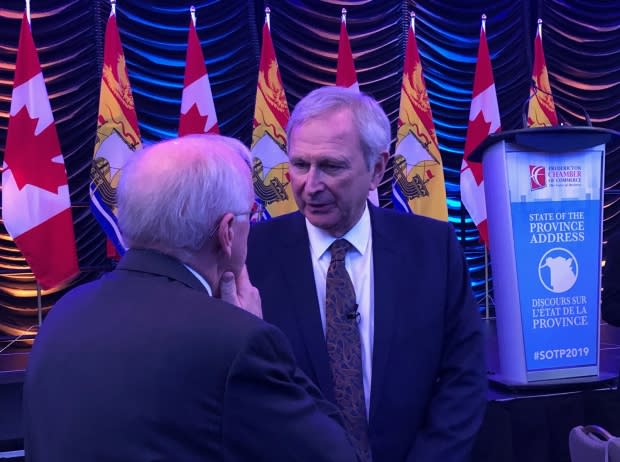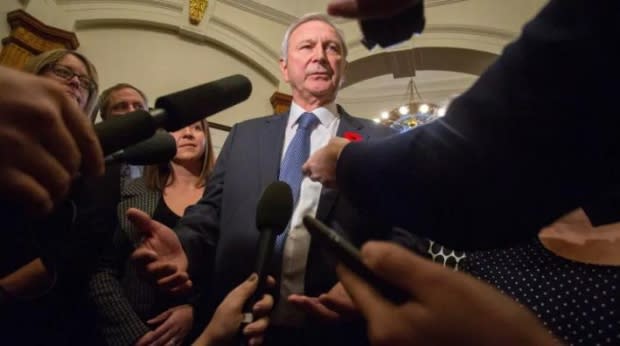Higgs proclaims New Brunswick deficit-free in first State of the Province address
New Brunswick is deficit-free this year and will have balanced budgets in the next two fiscal years as well, Premier Blaine Higgs announced Thursday night.
The new Progressive Conservative premier used his first State of the Province speech to reveal that his government has managed to eliminate a projected $131-million deficit in the current 2018-19 fiscal year.
That's despite taking power Nov. 9, more than halfway through the year.
He said the 2019-20 budget, to be tabled in the legislature March 19, will also be balanced.
That means Higgs is hitting his deficit-elimination target two years early. In last year's provincial election campaign, he promised a balanced budget in 2020-21.
"We wanted to show we could solve the problem here in New Brunswick with the tremendous workforce that we have in the civil service working for us each and every day," Higgs said in his speech at a dinner hosted by the Fredericton Chamber of Commerce.
"If higher transfer payments do arrive, we will have the happy choice of lowering taxes, paying down debt,or improving our education system."

In its November throne speech, the PC government promised to eliminate the small business tax and the so-called "double property tax" on secondary properties — but Higgs said that wouldn't happen until the deficit was gone. The government's capital spending plan in December cancelled more than $200 million in planned infrastructure work in the coming year.
That included a planned new courthouse in Fredericton, a new New Brunswick Museum in Saint John and a new school in the west end of Moncton. The previous Liberal government ran a $67-million surplus in 2017-18 but had projected a $188-million deficit for the current year, a projection that was updated to $131 million last fall.
Fears for credit rating
Higgs has said his top priority as premier is to eliminate the deficit as quickly as possible to avoid credit agencies downgrading the province's credit rating. A lower rating would force the province to pay higher interest rates on its accumulated debt, which is now above $14 billion. "A downgrade in our credit overnight means that we spend hundreds of millions more to borrow money — and to service the debt we already have," he said in the speech. The premier repeated his now familiar message that he'll avoid the temptation to spend tax dollars to make himself and his government more popular — though he didn't mention his cancellation this week of the Francophonie Games.

"We have already avoided some of the typical political games," he said. "Usually a new government rushes all of its projects and spending into the first year, so they can run up a bigger deficit and blame it on the past government. "We did not do that," he said. "We sent a clear message to credit rating agencies and investors by controlling spending in this fiscal year."
He contrasted that with the previous Liberal government, which he said increased spending by $1 billion over four years without any improvements in literacy scores, poverty rates or surgical wait times.
Not giving up on Energy East
Now, Higgs said, he is challenging New Brunswickers to embrace "a smaller and more responsive government" but also "a bigger sense of citizenship" that focuses on the province's long-term prosperity. He also suggested he'll use New Brunswick's geographic position as leverage to persuade Quebec to support a revival of the cancelled Energy East oil pipeline. Noting that Quebec is looking at new transmission lines that would let it sell its hydroelectricity into the United States, Higgs said allowing that electricity to pass through New Brunswick "won't be a one-way exchange." "If provinces want access to our grids, or our territory, to move their stranded assets, I will expect equal concern from them for our economic future," he said.
Higgs also said the province will reform social assistance so the rules aren't too strict for people new to the system or "tolerant of those who have been in the system for years."
That could include the government helping to pay for the travel of people on welfare in outlying communities so they can get to workplaces where there are shortages of employees. It could also mean helping with child care or housing.

